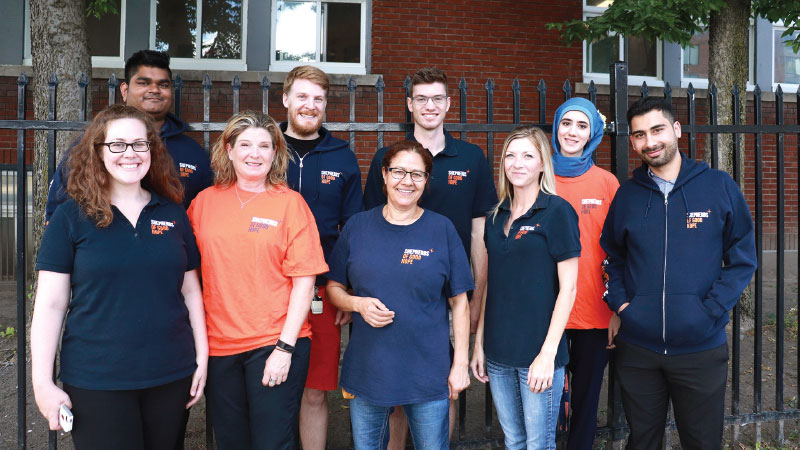By Caroline Cox, Senior Manager of Communications, Shepherds of Good Hope
For the past two years, the Shepherds of Good Hope team has been working tirelessly in the context of three crises. As an organization that supports people experiencing and exiting homelessness, the COVID-19 pandemic, toxic drug supply and critical affordable housing shortage have all taken their toll.
On February 6, the Mayor of Ottawa declared another state of emergency, this time in the context of the Freedom Convoy demonstration turned occupation. Our shelter, located a few blocks from Parliament Hill, is accustomed to demonstrations and large events. When we first heard about the Convoy, we naively advised our staff they may face delays getting to and from work the weekend of January 29.
What they faced was hours in traffic dwarfed by tall trucks and people banging on their windows. Trucks surrounded our shelter blaring horns day and night. Anxieties ran high, but staff and clients could find nowhere to get away from the noise that permeated the building.
On the evening of January 29, some protestors with the convoy demanded meals and gave staff a hard time when they were turned away. Later that night, a severely mentally ill shelter client was assaulted by two people exiting a truck.
A Twitter comment we made to correct misinformation went unexpectedly viral, prompting many media requests and a formal statement. We watched in amazement as 14,000 people, completely unprompted, donated approximately $750,000 to us, the overwhelming majority for the first time.
We’ve received countless messages of support from our neighbours, from people across Canada and around the world. We had productive dialogue with people who were either with the protest or who supported it, but did not support what had occurred at our shelter and wanted to make amends. We were also the target of misinformation online, stating that the events at our shelter had not occurred or were part of an “Antifa false flag operation.”
As the weeks wore on, the situation outside our shelter improved, but for residents closer to Parliament Hill, it only worsened. A local youth shelter, the Youth Services Bureau, needed to close its drop-in program for the first time in its history. Cornerstone, another local women’s shelter, reported their women were suffering from increased mental and physical health symptoms and substance use as a result of the constant noise, diesel fumes, sleep deprivation and general anxiety.
Everyone will have their own perspectives about what went down on the streets of Ottawa during these weeks, and no doubt there will be a comprehensive inquiry. Our goal throughout all of this has been to use our unexpected platform to amplify our message and that of our partners, to end homelessness in Ottawa.
To many of the people who donated to us following January 29, we were simply a downtown soup kitchen. But we are so much more than that. We are a community leader in supportive housing – a type of housing where residents have their own apartments, but live in a communal environment with 24/7 staffing. All of our supportive housing residents have some combination of trauma, mental health and substance use disorders. We provide comprehensive health and wellness services to them from aging at home services to harm reduction supports like our world-renowned Managed Alcohol Program.
We are on track to house more people in our supportive housing residences than we have in our shelter in a year’s time. We have two residences currently in development which will house 105 currently homeless individuals.
The donations that we received will have a huge impact on those projects, from furniture and equipment to offsetting rising pandemic-related costs.
To the 14,000 people who donated to us in the wake of the recent events in Ottawa, we are forever grateful to you. Most of you will never visit our programs, perhaps not even our city. But you should know that you are an important part of someone’s journey from homelessness to a forever home.
Caroline Cox has been with Shepherds of Good Hope for 15 years in many capacities, most recently as Senior Manager of Communications.



